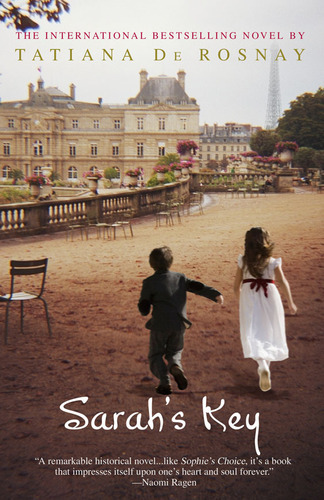
“Sarah’s Key” has to be one of the most interesting, thought-provoking novels I have read lately. It tells the story of two females: one, a girl named Sarah, is a Jew living in France during World War II. The other, Julia, is an American journalist living in Paris 60 years later. The subsequent story is how their lives intertwined, and how Julia’s is affected forever.
One day, in the middle of the night, the French police knock on Sarah’s door and arrest her and her parents. Sarah locks her four-year-old brother in their hiding place—a secret cupboard hidden in the wall of their bedroom—because she thinks she will be back the next day to free him.
Little does she know, she and her parents are not to be free again for a long time. First they are taken to a stadium with thousands of other French Jews and kept there with little food or water for days. They are then taken to a camp on the outskirts of Paris, and then to Auschwitz. This has come to be known as the Vel’d’Hiv roundup. It is at this camp on the outskirts of Paris that Sarah climbs under a fence and manages to escape.
After walking for hours, she comes to a farmhouse where an old couple hide her from the police. She begs them to take her to Paris, showing them the key and explaining to them that her brother is in her apartment, locked in a cupboard. Although it is dangerous, they agree to take her, telling the police she is their granddaughter. Upon her arrival at her apartment, she finds that another family has moved in. Rushing to her old bedroom, she unlocks the cupboard to discover the rotting corpse of her baby brother.
Forever changed by these traumatic events, Sarah continues to live with the old couple until she is 18, then moves to America to start a new life.
Sixty years later, an American journalist named Julia, who has lived in Paris more than half of her life, has been assigned the 60th commemoration of Vel’d’Hiv for her next project. Surprised that she didn’t know what it was before her research, Julia begins talking to Parisians. They either don’t know about it, or don’t want to talk about it.
It is when Julia mentions her project to her husband’s grandmother that she discovers that her husband’s family, his grandparents and father, was the ones who moved into Sarah’s apartment. When she asks her father-in-law about it, he initially refuses to speak about it but eventually helps her in her quest to find Sarah.
“Sarah’s Key” provides a completely different perspective of World War II and the Jewish concentration camps. I never learned about Vel’d’Hiv in history class, and I am willing to bet not many other people did either.
At times refreshing and at others absolutely heart wrenching, this novel is a personalized historical account, and for me, it flew by—I couldn’t put it down.
“Sarah’s Key” has shown me two things: the first is proof of how interconnected the world as a whole is. The second is that horrible things have happened in our history, and better than forgetting them is to remember the pain and the suffering of the people who lived through these events, not only to prevent something like this from happening again, but also to honor and remember their memories.